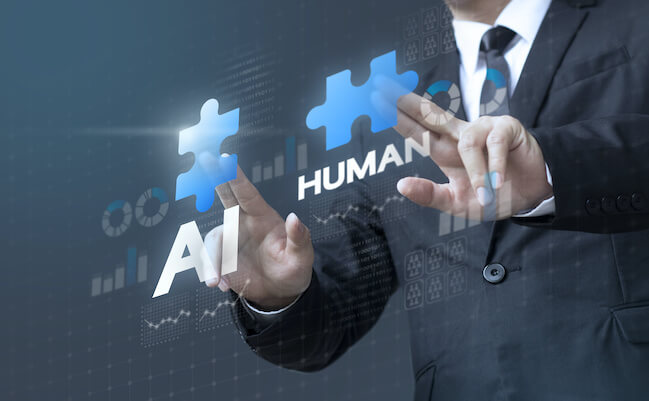[:en]Artificial intelligence and expert systems in business can increase organizational capability, but at the same time, despite hype and promise, they are no silver bullet and can also dumb your organization down.
Not long ago, researchers experiment in which optometrists were asked to identify the gender of a person based only on an image of the retina of a human eye. They got it right only fifty percent of the time—no better than guessing. An AI machine learning system fed the same data was ultimately able to determine gender over seventy percent of the time. That’s great for the machine, but unfortunate for the optometrists, because even though the machine was able get it right, no one actually knows how. In machine learning, there is no way to figure out what exactly the system is detecting. The machine becomes the expert and the humans unfortunately are no more expert than before the experiment began.
The CEO of a global European company in Japan once remarked to me the risks involved in developing for company a market intelligence system, like the ones in other markets the company serves around the world. He pondered what it would mean for development of business acumen and judgment of his people if they never learned to validate a market on their own, and always relied on what the machine advised. What would it mean if there was no way of even understanding why or how the machine reached its conclusion, just like in the experiment with the optometrists? Would his people and his business really be better off?
Amazon once built an expert system to identify candidates for leadership development early in their careers in order to remove apparent gender-bias toward men of humans. The machine ought to be objective, at least that was the reasoning, only that the people from whom the machine learned were not. The expert system turned out to be even more misogynistic than the humans. Amazon abandoned the system.
Expert systems using machine learning algorithms always require humans from whom to learn, at least in the beginning, but who will serve as teacher? At least some of the company’s sales and marketing people must know what questions to ask whom and how to analyze the resulting data as a human process before teaching the machine. Mimic the less than skillful, and an expert system will magnify human incompetence with machine-like speed and efficiency.
Machines don’t always get things right. It takes a human to judge when. Yet based on what you know from experience about how people often behave in an organization, what do you think the propensity of an individual staff or manager to override the decision of a much-touted expert system that advises the whole business?
One can always blame the machine with impunity. However, I have known more than one manager to prefer inaction over imperfection, and do the risk calculus accordingly. And that’s assuming there are still people in your company thinking for themselves. Human judgement is like a muscle. Fail to exercise it regularly, and judgement atrophies.
An airline pilot friend of mine once told me of the dangers of following “the magenta line” that appears on the three dimensional navigation display of aircraft indicating to the pilot which way to fly. He remarked that pilots under thirty-years-old follow the magenta line without questioning, even when it is obvious to an older pilot who cut his teeth in a time before such navigation systems that the magenta line is wrong. No matter how good these automated systems are, who do you want piloting your plane.
Too often we look for the technical panacea before the non-technical solutions have been exhausted, to the point where we forget even how to do things ourselves.
Too often we look for the technical panacea before the non-technical solutions have been exhausted, to the point where we forget even how to do things ourselves. Click To TweetI have watched other business people in services obsess over social media presence making large investments of money, time, and effort with the goal of acquiring new prospects and clients while putting no effort whatsoever in calling up current and past clients and asking for a referrals. In my experience, social media does little for a human relationship based business, whereas simply asking for referrals from a happy client works most of the time. Even in this hyper-connected world and golden age of social media, old-school methods often yield faster and superior results.
I remember watching with astonishment a movie scene depicting Buzz Aldrin making last minute calculations with a slide rule, while scratching with a pencil a pad of graph paper, just moments before touchdown on the moon, to ensure the lunar landing module did not run out of fuel—and as we all know he was successful, with only seconds of burn to spare. As competent as astronauts are today, I wonder how many among them could do the same under pressure without the aid of a computer.
Before you begin looking to implement the next technical innovation to thrust your staff forward, take a beat. How many people on your staff will lose the ability to perform human processes when a machine process just won’t do? How much human judgment in your organization will you abdicate to a computer, and how long before atrophy sets in?
You don’t have to let it, even if in your company atrophy has already begun.
[sc name=”Jonson Box” ][:ja]ビジネスにおいて使われている人工知能や専門のシステムが組織の機能を向上させてくれることは可能ではありますが、それがどのような内容を宣伝していようとも、絶対の効果があるものではありませんし、組織の知識レベルを低下させてしまうこともあります。
ある時研究者達が行った実験の話ですが、彼らは眼科医に人間の目の網膜だけを見せて、その人の性別を判定してもらいました。正解率はたったの50%でしたので、当てずっぽうで言っているのと同じような結果だったと言えるでしょう。一方で同じデータを与えられた人工知能の方は、やがては70%以上の確率で正しい答えを出せるようになりました。この結果を見ると機械が素晴らしいということになりますが、眼科医にとって残念なのは、どうやって機械が正解を導き出しているのかを知る事ができないという事です。機械学習においては、機械がキャッチしているのは何かということを、正確に知ることは無理なのです。機械がエキスパートになっていく一方で、人間の方はこの実験が開始される前と同じレベルの知識しか持ち合わせていないというのは残念な事です。
私はヨーロッパのグローバル企業の日本支社CEOから、市場人工知能を自分の会社のために開発することにまつわるリスクの話を聞いた事があります。彼がここで指しているのは、同社が事業を展開する日本国外の市場で使っているような人工知能のことです。もし社員達が自分自身で市場テストをする方法を学ばず、常に機械のアドバイスに頼らざるを得ない状況になってしまったら、彼らのビジネスに関する洞察力や判断力の成長にとってどのような影響があるか、と彼は考えてしまったそうです。上記の眼科医に対する実験のように、機械がある結論に達した際に、その理由、方法さえ理解する術がないとしたらどうでしょうか。彼のビジネスは本当に以前より改善したと言えるでしょうか。
アマゾンは過去にまだキャリアの浅い社員の中からリーダーシップ教育を受けさせる社員を見つけるためのエキスパートシステムを作った事があります。その目的は、女性より男性を明らかに優遇してしまうという人間の眼鏡を取り除くためでした。機械であれば客観的である筈だ、というのがその根拠にあったわけですが、残念なことにその機械は客観的とはいえない人間から学んでいたのです。その結果、このエキスパートシステムは実は人間より女性蔑視をしているという事がわかり、アマゾンはそれを使うことを止めたのでした。
機械学習アルゴリズムを使っているエキスパートシステムは、少なくとも最初は人間から学ばねばなりませんが、教えることができるのはどのような人でしょうか。会社の営業部やマーケティング部には、人間によるプロセスとして、誰に質問をし、そこから得たデータを分析する方法を知っている社員が何人かはいる筈で、それに基づいて機械に教えることになります。もし技能のあまりない人から学んでしまえば、エキスパートシステムは機械であるが故の早いスピードと効率で、そのできない部分をよりしっかり取り入れてしまうことでしょう。
機械はどのような時でも正確に理解してくれるわけではありません。それを判断できるのは人間です。しかし、会社内での社員のこれまでの態度から考えて、一社員、或いはマネージャーが、とにかく評判の高いエキスパートシステムからのビジネスへのアドバイスに反対する傾向はどのくらいあると思われますか。
うまくいかなくても、それが自分のせいではなく機械のせいだと言うことは簡単です。ですが、不完全さより行動を取らないことを選んでリスクを計算するようなマネージャーが多くいることを私は知っています。あなたの会社にも自分のことを第一に考えるような人がまだいる場合ですが。人間の判断力は筋肉のようなものです。毎日使っていないと、判断力は衰えてしまいます。
これはパイロットである友人から聞いた話です。飛行機には、3Dのナビゲーション画面に映る「マジェンタ・ライン」と呼ばれるラインがどの方向に飛ぶべきかを示してくれるのですが、それに頼ってしまうと危ないのだそうです。そのようなナビゲーションシステムが導入される前から飛行機の操縦を行っていたベテランパイロットの目から見るとマジェンタ・ラインが間違っている事が明らかであるような場合でも、30歳以下の若いパイロット達はとにかくマジェンタ・ラインを疑うことさえしないといいます。こういったオートマチックのシステムがいかに優れていたとしても、もしあなたが飛行機に乗るとしたら、どのようなパイロットに操縦してもらいたいと思いますか。
我々は、テクノロジーを使わない解決法を全て試みる前からテクノロジーによる解決を求めてしまう事が多すぎるきらいがあり、自分自身でやる方法を忘れてしまうことさえあります。
あなたの会社では、テクノロジーに頼りすぎるせいで、自分自身で考えて解決法を導き出すやり方さえ忘れてしまった社員が増えていませんか。 Click To Tweet私の周りにも、ソーシャルメディアを使うことに必死になって金銭や時間、努力をかなり使って見込み客や顧客を獲得しようとする一方で、現在やかつての顧客に連絡して他の人々を紹介してもらうことさえ全然行っていない人達がいます。私の経験から言うと、ソーシャルメディアは人間同士の関係に基づいたビジネスにおいては大して役に立ちませんが、単に得意先に知り合いを紹介してもらうよう依頼するというシンプルな方法は大抵うまくいきます。現在のようなバーチャルで繋がった世界でも、ソーシャルメディアの最盛期であっても、古くからのやり方の方がより早く素晴らしい結果をもたらしてくれる事が多くあるのです。
ある映画で、バズ・オルドリンが月面着陸の寸前に、着陸船が燃料不足にならないための最終計算を、グラフ用紙のノートに鉛筆で書き込みを行いながら、計算尺を使ってやっているシーンがあり、驚いた事があります。それは皆さんもご存知のように結局あと何十秒かで燃料がなくなる、というギリギリのタイミングでうまくいきました。現在活躍する宇宙飛行士の方々も優秀だとは思いますが、彼らの中にはオルドリン氏のようにプレッシャーのもと、コンピューターの助けなしで同じような事ができる人はどのくらいいるでしょうか。
あなたもこの次に社員達に使ってもらう新しいテクノロジーを取り入れる前に、考えてみて下さい。機械のプロセスでは対処できないような場面で人間によるプロセスを行う能力をなくしてしまう社員はどのくらい出てくるでしょうか。コンピューターには会社で人間が行っている判断をどのくらい任せるつもりですか。そしてその結果、我々の能力が退化してしまうのにどれ位の時間がかかると思われますか。
例えあなたの会社で退化が既に始まっていても、そのまま放っておく事はありません。
[sc name=”Jonson Box” ][:]


